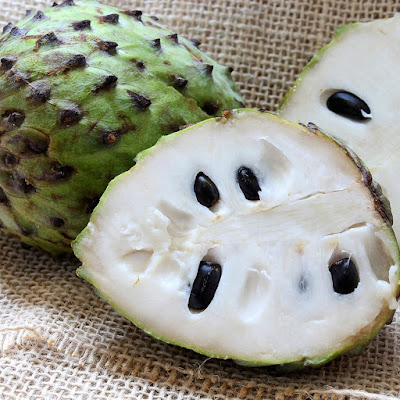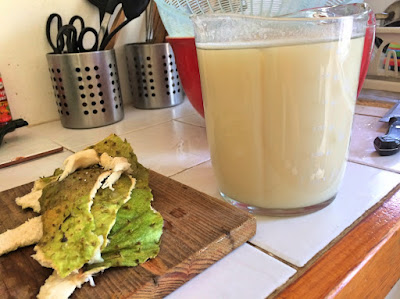HEALTH BENEFITS OF SOURSOP
Soursop is a fruit that goes by many names, such as Guanabana and guyabano. Its scientific name is Annona muricata, a broadleaf, flowering evergreen tree. It is native to the warm and tropical regions of Central America and the Caribbean, but is now widely cultivated in tropical and subtropical climates throughout the world
Soursop is a member of the custard apple family. The fruits are
large and oval-shaped, with an aroma similar to pineapple, and the flavor can
be described as a combination of strawberries and apple, contrasting with a
thick creamy texture reminiscent of banana. The green exterior, which has spines on it,
covers a white, fibrous flesh. The fruit
is called soursop due to its slightly acidic taste when ripe.
Soursop is high in vitamin c,
an antioxidant known to boost immune
health. This vitamin strengthens the immune
system, improving its ability to defend against
pathogens. It also promotes the destruction of free radicals, which can help to
protect your skin and cells from
environmental oxidative damage. Soursop contains many other antioxidants which play a vital role in overall health.
Other health benefits of soursop include:
Healthy Digestion
Due to
its high fiber content, soursop may aid with proper digestion. The fruit’s
juice can also act as a diuretic and cleanse the gastrointestinal tract by
removing excess sodium from the body. An extract of soursop has been shown to
help heal gastric ulcers in lab animals. One whole soursop fruit
contains around 83% of the recommended daily allowance of fiber, which is a vital nutrient for your digestive health. Fiber
helps to promote regularity and prevent digestive issues such as constipation.
Potential anti-carcinogenic effects
A study reported that extracts from soursop fruit, as well as
the tree's bark, roots, and leaves, had the therapeutic potential to combat
cancer and other non-malignant diseases. The study also found that soursop
extract could reduce the size of breast cancer
tumors, kill cancer cells, and stop the formation of leukemia cells. However, not enough human data
support this claim.
Many of the reported benefits of soursop are due to
its high content of antioxidants. Antioxidants fight
free radicals, reducing the damage to your cells caused by oxidative stress. One of the side effects of oxidative stress is inflammation. The antioxidants
in soursop may, therefore, help to reduce inflammation in the body.
Stabilizes blood pressure
High blood pressure may lead to serious issues like heart disease and heart attack. A
contributing factor to high blood pressure is sodium intake. Potassium helps your body to get rid of sodium and eases the
tension in the walls of your blood vessels, both of which can help to lower
your blood pressure . A whole soursop fruit offers approximately one-third to
one-half of your recommended daily allowance of potassium.
Fight against bacteria
In addition to its antioxidant properties, some studies show that soursop may contain potent antibacterial properties as well. One study found that an extract may be able to kill many different types of bacteria, including strains that cause gum disease and cavities. Another study found that soursop extracts may help to fight cholera and Staphylococcus bacteria.
Soursop is picked before the fruit is fully ripened. While the unripe fruit is green, it turns to a yellow-green to indicate maturity. The unripe fruit can be stored on the counter. Once mature, you should store it in the refrigerator and use it within a few days.
Soursop fruit is delicious raw, and the leaves are used for making tea. There are other ways to use the fruits, such as:
- Ice cream
- Sorbets
- Juices
Keep in mind that the seeds of the soursop should be
avoided, as they have been shown to contain annonacin, a neurotoxin that may
contribute to the development of Parkinson’s disease.
Below is a juice recipe, a popular drink in Jamaica using soursop.
INGREDIENTS
1 Medium ripe soursop
4 Cups water
6 Tbs. condensed milk
2 Tbs White sugar
2 tsp Vanilla
½ tsp cinnamon
½ tsp. nutmeg
1 tsp Jamaican White rum (optional)
- Remove the skin and core from fruit
- Place soursop pulp in a large bowl
- Add water to pulp and gently squeeze to remove juice
- Pour in to container using a mesh strainer and gentle press the pulp with the back of a spoon to help get the juice into container.
- Add Milk, Sugar and spice.
- Stir until sugar is dissolved
- Put in refrigerator until chill
Alternatively, we could omit milk and spices and replace with lime juice. Also a blender could be used instead of
squeezing by hand









Comments
Post a Comment